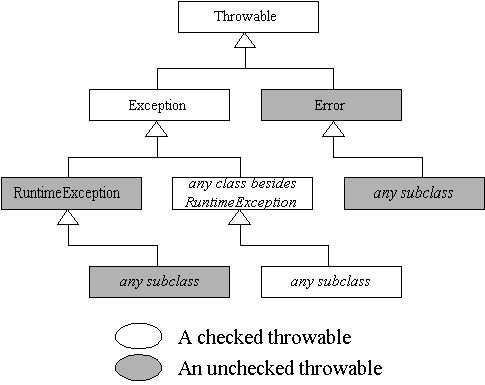Difference between Unchecked exception or runtime exception
This was an interview question. What is the main difference between unchecked exception and error as both are not caught? They will terminate the program.
Answer
As stated by their name, unchecked exceptions are not checked at compile-time which means that the compiler doesn't require methods to catch or to specify (with a throws) them. Classes belonging to this category are detailed in the section 11.2 Compile-Time Checking of Exceptions of the JLS:
The unchecked exceptions classes are the class
RuntimeExceptionand its subclasses, and the classErrorand its subclasses. All other exception classes are checked exception classes. The Java API defines a number of exception classes, both checked and unchecked. Additional exception classes, both checked and unchecked, may be declared by programmers. See §11.5 for a description of the exception class hierarchy and some of the exception classes defined by the Java API and Java virtual machine.
The following picture illustrates the Exception hierarchy:

The class Error and its subclasses are exceptions from which ordinary programs are not ordinarily expected to recover and, as explained in 11.5 The Exception Hierarchy:
The class
Erroris a separate subclass ofThrowable, distinct fromExceptionin the class hierarchy, to allow programs to use the idiom:} catch (Exception e) {to catch all exceptions from which recovery may be possible without catching errors from which recovery is typically not possible.
To summarize, RuntimeException are a subset of unchecked exceptions for exceptions from which recovery is possible (but unchecked exception is not a synonym of RuntimeException as many are answering here).